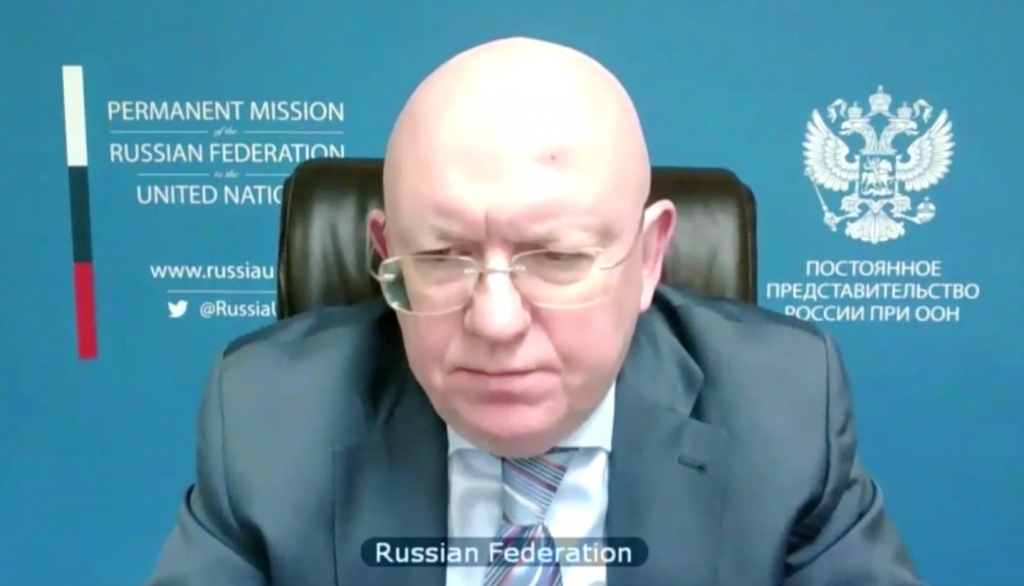Statement by Permanent Representative Vassily Nebenzia at an open briefing of UNSC members on the political situation in Syria
Mme. President,
We thank G.Pedersen for the briefing. We also listened carefully to Mr. Bernard Duhaime.
In this anniversary of the Syrian crisis, we are faced with two questions. What let this conflict last that long? And what can we do to put an end to it as soon as possible?
External forces used the unrest that flared up in March 2011 to “stir up” the situation in Syria. They aimed to overthrow the legitimate authorities and reform the country as they saw fit. Syria was rapidly delving into chaos, illegal armed formations gained a foothold at the major part of its territory, among them were terrorist groups that terrorized the local population, instilled extremism and intolerance, and in general committed unspeakable crimes against civilians.
However, the Syrian statehood could withstand the unprecedented terrorist pressure. Given Russia’s decisive support, the Syrian authorities were able to break the backbone of ISIL and put out other hotbeds of terrorism on its land. Now the liberated areas have got down to restoring the devastated socio-economic infrastructure.
In the framework of the effective and well-considered action of the Astana format, Russia, Turkey, and Iran jointly achieved a sustainable ceasefire at the major part of Syria’s territory. Hotbeds of tension still remain in the Idlib de-escalation zone, where 'Hayat Tahrir al-Sham' (listed by SC as a terrorist organization) holds its positions. As of today, the ceasefire in Syria is generally holding. Had it not been for the ongoing recharge of militants and separatists and the attempts to whitewash them, the entire territory of Syria would have been liberated from extremists.
There can be no military solution to the Syrian conflict. It can only be resolved by promoting the political process based on UNSC resolution 2254, with UN assistance granted.
Following the decisions of the Congress of Syrian National Dialogue in Sochi, Syria established the Constitutional Committee, which remains active today. Though its progress does not come easily, it is vital that we support and encourage this process in every possible way. At the same time, we proceed from the understanding that intra-Syrian negotiations constitute an internal affair of Syrians that does not tolerate any artificial deadlines or external pressure. We stand ready to further support Special Envoy Pedersen in establishing constructive contacts between the Syrian sides.
The Syrian authorities need support of the international community today as never before. In his recent statement, the Secretary-General said that 60% of Syria’s population are at risk of hunger. The people are in need of collective international assistance, and this problem cannot be solved by merely distributing food. We must help ordinary Syrians restore peaceful life by carrying out early recovery projects for the infrastructure. We are convinced that such an approach would facilitate the return of Syrian refugees and IDPs to their homes. Today the surveys show that most of them are not losing hope to get back to their homeland.
Despite all the hardships that Syrians are living through, the political opponents of Damascus decided to take the country by starvation. Once forceful attempts failed to overthrow the unwanted government, they switched to financial and economic pressure. Syria has encountered sanctions that put immense constraints on the country’s normal life. In fact, ordinary Syrians are suffering collective punishment. At the same time, West-proclaimed humanitarian exemptions from sanctions regimes simply do not work – a fact that leads to further deterioration of the socio-economic situation in Syria. By the way, UN humanitarians, who are deployed on the ground in Syria, are also being rather critical about this situation.
Syria’s return to the Arab family, in particular to the Arab League, would greatly contribute to normalization in this country. We welcome the readiness of Damascus and the Arab states to move on in this direction. And we call not to impede this emerging normalization between Damascus and the Arab world. What we believe to be the main prerequisite for a peaceful settlement is putting an end to the foreign occupation and armed action, which is not coordinated with the legitimate government; as well as respect for the sovereignty, independence, territorial integrity, and unity of Syria envisaged by UNSC resolution 2254.
Thank you.
